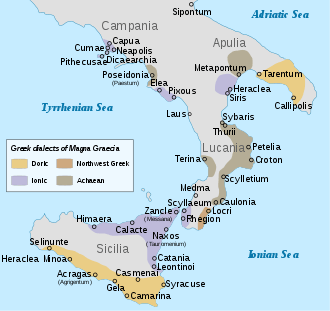Agoranomus
An agoranomus or agoranomos (Greek: ἁγορανόμος), in antiquity, was a magistrate of Athens: there were ten and they maintained order and policy in the markets, settled disputes, examined of the quality of the articles exposed for sale, inspected weights and measures, collected the harbour dues and enforced the shipping regulations. The agoranomus had much the same function as the curule aedile among the ancient Romans.[1]
The word is compounded of the Greek ἁγορά ("market"), and νέμειν ("to distribute"). Aristotle distinguishes two kinds of magistrates, the agoranomi, who had the intendance of the markets, and the astynomi, who inspected the buildings.
References
- Chisholm, Hugh, ed. (1911). . Encyclopædia Britannica. 1 (11th ed.). Cambridge University Press. p. 381.

This article is issued from Wikipedia. The text is licensed under Creative Commons - Attribution - Sharealike. Additional terms may apply for the media files.
